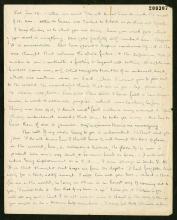BRACERS Record Detail for 19313
To access the original letter, email the Russell Archives.
Letter 25
BR TO CONSTANCE MALLESON, 22 JUNE [1918]
BRACERS 19313. AL. McMaster
Previous Brixton letter, BRACERS 19312; next letter, BRACERS 19315
Edited by K. Blackwell, A. Bone, N. Griffin and S. Turcon
<Brixton Prison>1
Sat. June 22.
When we meet2 I do not know how to make the most of the time — either to learn all I want to be told or to show all I feel. I keep thinking as to what you are doing — how your work goes,3 what your mood is, everything. One gets fearfully self-centred here — I suppose it is unavoidable. But love grows and deepens continually — it is the one thought that colours the whole future — and the difference that it makes to one’s outlook and feeling is beyond all telling. No nightmare horrors come now, only solid tangible troubles of an outward sort, which are nowhere near as bad. Dear I want you to give out to the world the wonderful things that are in you — life, passion, and above all, love. Ever since Clee Hill I have felt a new deeper union, in work and ultimate purpose — which was lacking before. Being now sure of it, I don’t need fresh evidence every moment, and I shall always understand moods that seem to take you away. One has to have them if one is genuine. Only ungenuine things are unvarying.
The call of my whole being to you is unbounded. Without what you give I do not know how I should have lived through this time of gloom in the world; here, in solitude and leisure, the gloom of the war is pressed into one’s very soul, and becomes hard to bear. — I will not endure long imprisonment as a C.O.4 — I can always imitate F.M.5 It is that thought that keeps me from the depths. I had forgotten that way for a time, oddly enough. I will live with your love — while it is there for me in the world, so long as there is an honest way of coming out to you, I will take it. One third of my time is up!6 I bless you, and I believe in you with all my soul. And I do not want ever to stand in the way of things you ought to do. Heaven help mankind. I dare not think of the world at large.
- 1
[document] The letter was edited from the unsigned original in BR’s handwriting in the Malleson papers in the Russell Archives. The sheet is lined on one side and folded twice.
- 2
When we meet Colette expected to visit BR in prison on 26 June. He was allowed one visit of three people for half an hour, once a week, every Tuesday or Wednesday, apart from business visitors. Early in his incarceration Colette had been in Manchester and then York and Scarborough. She was touring with a theatre company, playing the role of Mabel in Phyl (author unknown) She had made at least one visit by 4 June (before she left on that tour) because in a letter she wrote that day she mentioned she had already visited Brixton (BRACERS 113134).
- 3
your work goesColette wrote in reply on 24 June that she was still full of energy from the tour. She and Miles were thinking of starting an Experimental Theatre from which Miles would be able to earn a small income (BRACERS 113135).
- 4
imprisonment as a C.O. BR was hinting at the possibility of prolonged detention in military or civil custody, should he be called up for military service after his release from Brixton, have his claim for absolute exemption rejected, then refuse to undertake “alternative” war work. In April 1918 the upper-age limit for British conscripts had been raised from 40 to 50 (see note 5 to Letter 6).
- 5
imitate F.M. And go on a hunger strike. Francis Meynell describes his hunger strike in detail in My Lives (London: Bodley Head, 1971), pp. 99–103. He was not in prison, however, but at Hounslow Barracks with other C.O.s from 29 January 1917. He collapsed after twelve days without food or water and got a unconditional discharge from the army after agreeing to take nourishment.
- 6
One third of my time is up! BR had then been imprisoned for 53 days. To calculate that one third of his time was up, he must have projected being released in early October (2 October would have marked 155 days) and been cognizant of the general rule stated by Sir George Cave to Frank when the brothers hoped for an even earlier remission: “The Prison Commissioners, however, are able under the rules to grant remission up to one-sixth of the sentence to prisoners who earn it by good conduct and industry, and I have informed them that they would be justified, in view of the work which your brother has been doing during his imprisonment, in awarding him the full number of marks, that is to say, he will only be required to serve five months instead of six and will be due for release at the end of September” (5 Aug. 1918., BRACERS 57178). This was official confirmation of a release date slightly earlier than the date of 2 October to be found in the Home Office file minutes. An even earlier date was going to be considered by Cave (see Letter 52).

